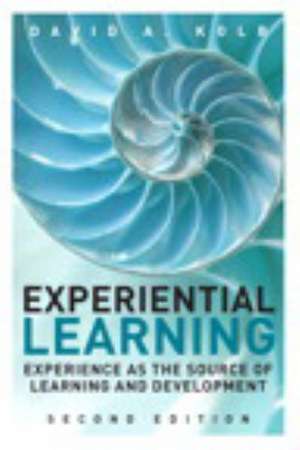Experiential Learning: Experience as the Source of Learning and Development
Autor David A. Kolben Limba Engleză Hardback – 21 dec 2014
Preț: 787.73 lei
Preț vechi: 915.97 lei
-14% Nou
150.74€ • 158.10$ • 125.48£
Carte disponibilă
Livrare economică 11-25 martie
Specificații
ISBN-10: 0133892409
Pagini: 416
Dimensiuni: 168 x 257 x 25 mm
Greutate: 0.77 kg
Ediția:Revised
Editura: Pearson FT Press
Notă biografică
Textul de pe ultima copertă
- A complete structural model of learning, integrating modern insights from psychology, philosophy, and physiology
- Ranges from ELT s history to its newest applications in higher education and lifelong learning
- Introduces the powerful nine-style Kolb Learning Style Inventory 4.0 with assessment of learning flexibility
"Progress on the trail blazed by James, Dewey, Follett, and Vygotsky" Learning cycles and learning spirals: a dynamic view of human learning
"Learning by resolving the dual dialectics of action/reflection and experience/abstraction" Nine learning styles: the Kolb Learning Style Inventory 4.0
"Reliably identifying learning styles and learning flexibility based on 30+ years of empirical and clinical research" Becoming an experiential educator
"Finding a better way to help learners learn" "
Cuprins
Foreword x
About the Author xii
Preface xiii
Introduction xvi
Part I Experience and Learning
Chapter 1 The Foundations of Contemporary Approaches to Experiential Learning 1
Experiential Learning in Higher Education: The Legacy of John Dewey 4
Experiential Learning in Training and Organization Development: The Contributions of Kurt Lewin 8
Jean Piaget and the Cognitive-Development Tradition of Experiential Learning 12
Other Contributions to Experiential Learning Theory 15
Update and Reflections 19
Foundational Scholars of Experiential Learning Theory 19
Liminal Scholars 20
Contributions to Experiential Learning 23
Chapter 2 The Process of Experiential Learning 31
Three Models of the Experiential Learning Process 32
Characteristics of Experiential Learning 37
Summary: A Definition of Learning 49
Update and Reflections 50
The Learning Cycle and the Learning Spiral 50
Understanding the Learning Cycle 50
The Learning Spiral 61
Part II The Structure of Learning and Knowledge
Chapter 3 Structural Foundations of the Learning Process 65
Process and Structure in Experiential Learning 66
The Prehension Dimension-Apprehension Versus Comprehension 69
The Transformation Dimension-Intention and Extension 77
Summary 85
Update and Reflections 87
Experiential Learning and the Brain 87
James Zull and the Link between the Learning Cycle and Brain Functioning 88
My Brain Made Me Do It? 94
Chapter 4 Individuality in Learning and the Concept of Learning Styles 97
The Scientific Study of Individuality 98
Learning Styles as Possibility-Processing Structures 100
Assessing Individual Learning Styles: The Learning Style Inventory 104
Evidence for the Structure of Learning 111
Characteristics of the Basic Learning Styles 114
Summary and Conclusion 135
Update and Reflections 137
Individuality, the Self, and Learning Style 137
Western and Eastern Views of the Self 138
Experiential Learning and the Self 139
Learning Style 141
Chapter 5 The Structure of Knowledge 153
Apprehension vs Comprehension-A Dual-Knowledge Theory 154
The Dialectics of Apprehension and Comprehension 159
The Structure of Social Knowledge: World Hypotheses 164
Summary 173
Social Knowledge as Living Systems of Inquiry-The Relation between the Structure of Knowledge and Fields of Inquiry and Endeavor 175
Update and Reflections 186
The Spiral of Knowledge Creation 186
Personal Characteristics and Ways of Knowing 188
Knowledge Structures and Disciplinary Learning Spaces 190
The knowledge Structures of Experiential Learning 192
Part III Learning and Development
Chapter 6 The Experiential Learning Theory of Development 197
Learning and Development as Transactions between Person and Environment 198
Differentiation and Integration in Development 199
Unilinear vs Multilinear Development 201
The Experiential Learning Theory of Development 205
Consciousness, Learning, and Development 210
Adaptation, Consciousness, and Development 216
Update and Reflections 225
Culture and Context 226
Individual Differences and Multilinear Development 227
Integration and Advanced Stages of Adult Development 228
Implications for Experiential Learning Theory Development Theory 234
Chapter 7 Learning and Development in Higher Education 239
Specialized Development and the Process of Accentuation 242
Undergraduate Student Development in a Technological University 244
Professional Education and Career Adaptation 261
A Comparative Study of Professional Education in Social Work and Engineering 263
Managing the Learning Process 276
Implications for Higher Education 283
Update and Reflections 287
Becoming an Experiential Educator 287
Chapter 8 Lifelong Learning and Integrative Development 311
Adaptive Flexibility and Integrative Development 315
On Integrity and Integrative Knowledge 327
Update and Reflections 333
Lifelong Learning and the Learning Way 333
Bibliography 355
Index 377
